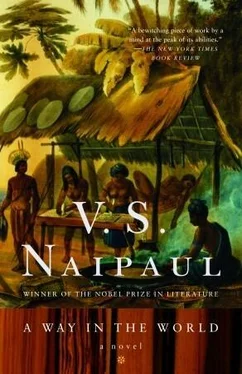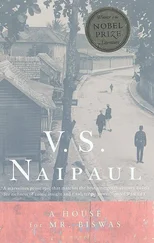The planters are refugees from Haiti and the other French-speaking islands to the north. The planters are not all white. There are many mulattoes and blacks among them, and they are known, in the caste language of the time, as “free people of colour”; they are not called Negroes. An unusually high proportion of the slaves in Trinidad are “new Negroes,” freshly imported from Africa.
The island now lives by and for these plantations, and away from them there is almost no life. Travel is controlled. There are no wanderers, no floating, free population. There is no place here for a metropolitan man like Miranda. There must have been times during the year when — waiting on developments, and at the mercy of the British government — he would have felt like a prisoner, and wondered whether he would ever get out, leave what had once been part of his native land, and go back to London, to his house and family.
After a long, idle year he does go back. This is where his story should have ended, with this escape from what had once been part of his native land. That would have been irony enough. But he isn’t allowed to go out on a dying fall. He is too famous, has been active for too long, has talked too much. Another fate has been prepared for him.
Three years later the real revolution in Venezuela is started by Bolívar and others. They call Miranda out from London. They think they need him. Miranda is the most famous South American or Spanish American of his time; he knows important people in England and the United States. The revolutionaries also believe they need Miranda’s military skill: the word among South Americans is that in military matters he is second only to Napoleon. (For eleven years he had been a captain in the Spanish service in Spain, North Africa, and the West Indies. Fleetingly, before he deserted and went to the United States, he was a colonel. But when he got to France he encouraged the French to believe that he had been a general in the American War of Independence; and, in the early days of the French Revolution, he had served for seven months as a general in the revolutionary army, until he was arrested for incompetence.)
So, unexpectedly, after the rout and disgrace and idleness of three years before, there is this complete triumph for Miranda. He lands in Venezuela to a ready-made revolution (such as he has been predicting for twenty years), and is received ceremonially as its leader and hero. For a while everything goes well. The Venezuelan revolution is triumphant, and Miranda as general secures its victories — though his engagements are particularly bloody, and the revolutionary who talks about civil liberty turns out to have a brutal, too assertive side. This brutality is one of the things that make people question the revolution.
Miranda had left Venezuela when he was twenty-one, and in 1810–11 he had been away for nearly forty years. And just as in that time he had made himself over many times — becoming a lover of liberty among the Americans; a revolutionary among the French; a Mexican nobleman and a count among the grandees of the Russia of Catherine the Great; a ruler in exile among the British, a man who could open up a whole continent to British manufactures — so in his projections Venezuela and South America had been steadily adapted to the fantasies of late eighteenth-century European thinkers. The people of the continent deserved the best. Both whites and Indians were worthy of Plato’s republic. And then, in a further version of this fantasy, both whites and Indians somehow became Incas, as pure and as noble as the philosophers had judged such people to be.
But the Venezuela in which Miranda now finds himself isn’t like that at all. Venezuela is more like the Trinidad Miranda was lucky to escape from three years before. Venezuela is a colony in the New World, with slave plantations, and it has all the divisions of that kind of place: Spaniards from Spain, who are the officials; a creole Spanish aristocracy; creole Spaniards who are not aristocracy; mulattoes; the Negroes of the plantations; the aboriginal Indians. This kind of place is held together only by a strong external authority. When that external authority goes, people can begin to feel they are sinking. Freedom for one group can mean slavery or oppression for another group.
So the Venezuelan revolution, as it progresses, deepens every racial and caste division in the country, encourages every kind of fear and jealousy; and the revolution begins to fail. The ordinary people of the country begin to go over to the other side, the side of old authority, and the reverences and law and religion they know.
Miranda appeals to the slaves to join him. They don’t listen; in fact, as the area controlled by the revolutionaries shrinks, the slaves of Barlovento rebel, and there is a moment when it seems they might capture the capital, Caracas. And now, to buy peace, or at any rate to buy time, some of the very men who had called Miranda out from London, to lead their revolution, decide to hand him to the Spaniards. They wake him up one night and march him to the dungeon of a coastal fort.
That is where it ends for Miranda: the fate he has feared ever since he deserted nearly thirty years before. This fear has grown through all his life as a revolutionary. He fears Spanish prisons as only a former Spanish officer can fear them; he fears the legal-religious cruelty and vengefulness of Spanish punishments as only a man who has dealt in these things himself can fear them. In the recent Venezuelan wars he has had men hanged; he has had heads spiked.
He is sixty-two now. He has four more years to live. All these years will be spent in jail; some of the time he will be chained. He will never see London and his family again. He will move from the jail in Venezuela to the jail in Puerto Rico, to the dungeons of Cadiz. The dungeons of Cadiz are infamous. But when the captain-general of Puerto Rico, who handles Miranda with honour throughout, comes to tell him that orders have come for him to be taken to Cadiz, Miranda embraces the captain-general and thanks him. As though he is content at the end to lay aside the fantasies of thirty years — fantasies of an immense Spanish-American republic of Colombia stretching from the source of the Mississippi (all the land west of the river) down the length of the continent to Cape Horn, fantasies of Incas worthy of Plato’s republic, fantasies which (like Columbus’s ideas about the New World, and Raleigh’s) also contained a dream of a fabulous personal authority.
THROUGHOUT HIS adult life Miranda was particular about his papers. He kept everything he considered important, sometimes even printed invitations. He did so at first as a traveller, one of the earliest South Americans out in the greater world; later he kept things out of a sense of history and personal destiny. If he isn’t well known now it isn’t only because he achieved little, and because the South American revolution doesn’t have the universal appeal of the three great revolutions — the American, the French, and the Haitian — that came earlier. It is also because on the day he was betrayed he was separated from his papers — the sixty-three leather-bound folio volumes he had brought out from England two years before — and the papers were lost for more than a century. When the papers were recovered the South American revolution had receded, its history had hardened, and, as with the corpses at Pompeii, where Miranda should have been there was a void.
For Venezuelans Miranda is the Precursor, the man before Bolívar. And when I first read about Miranda and began to look at his papers, I too, but in my own way, thought of him as a precursor. I saw him as a very early colonial, someone with a feeling of incompleteness, with very little at home to fall back on, with an idea of a great world out there, someone who, when he was out in this world, had to reinvent himself. I saw in him some of my own early promptings (and the promptings of other people I knew).
Читать дальше












